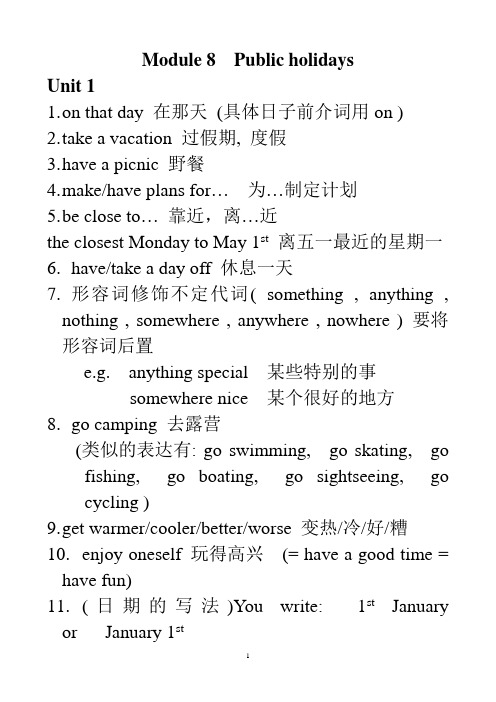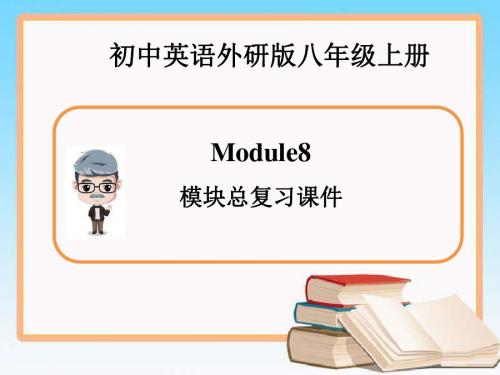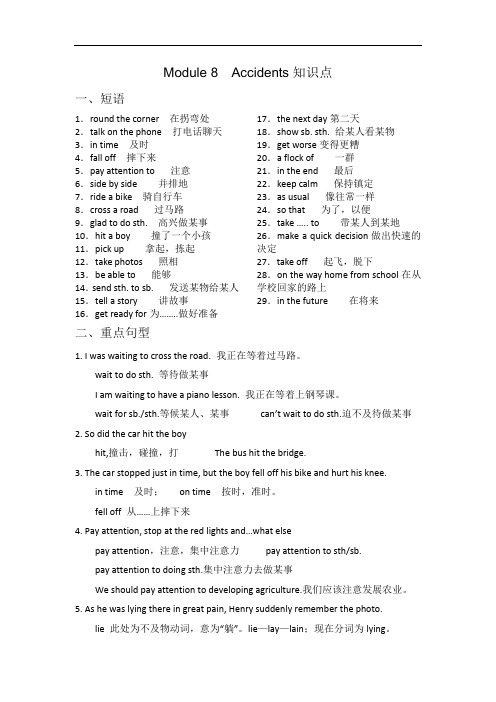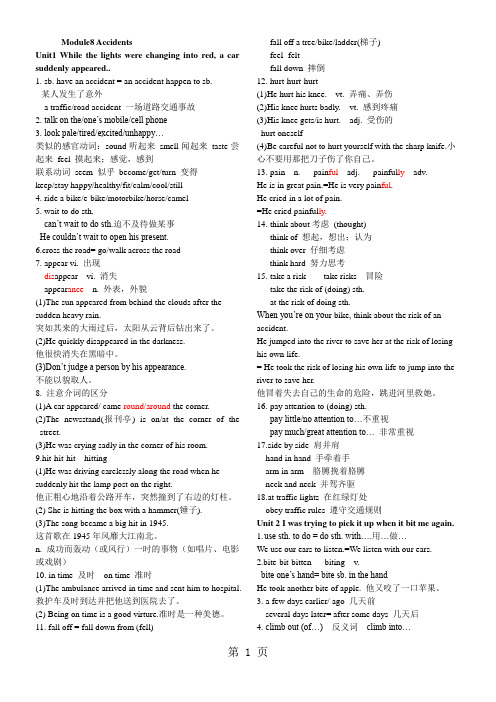外研版八年级英语上Module 8讲义(含导入及详细知识点)
外研版英语八年级上册Module8《Accidents》(Unit3)说课稿

外研版英语八年级上册Module 8《Accidents》(Unit 3)说课稿一. 教材分析《Accidents》(Unit 3)是外研版英语八年级上册Module 8的一部分,主要讲述了交通事故的话题。
通过本节课的学习,学生能够掌握关于交通事故的词汇和表达方式,提高他们在实际情景中的口语交际能力。
教材内容丰富,贴近生活,有助于激发学生的学习兴趣。
二. 学情分析八年级的学生已经具备了一定的英语基础,对日常生活中的一些常见场景有了初步的了解。
但他们在口语表达方面仍有待提高,特别是如何在实际情景中运用所学知识。
因此,在教学过程中,需要关注学生的个体差异,充分调动他们的积极性,鼓励他们主动参与课堂活动。
三. 说教学目标1.知识目标:学生能够掌握关于交通事故的词汇和表达方式,了解交通事故发生的原因和预防措施。
2.能力目标:学生能够在实际情景中运用所学知识,提高他们的口语交际能力。
3.情感目标:教育学生遵守交通规则,培养他们的安全意识。
四. 说教学重难点1.重点:交通事故的词汇和表达方式,以及在实际情景中的运用。
2.难点:如何引导学生运用所学知识进行口语交际,提高他们的实际应用能力。
五. 说教学方法与手段1.任务型教学法:通过设定各种交通事故的场景,让学生在完成任务的过程中,自然地学习和运用所学知识。
2.情境教学法:利用图片、视频等教学资源,创设真实的交通事故场景,激发学生的学习兴趣。
3.交际型教学法:鼓励学生积极参与课堂活动,进行角色扮演,提高他们的口语交际能力。
4.教学手段:多媒体课件、交通事故图片、视频、角色扮演等。
六. 说教学过程1.导入:通过展示交通事故的图片,引导学生关注本节课的主题。
2.新课呈现:讲解交通事故的词汇和表达方式,让学生初步了解交通事故的原因和预防措施。
3.课堂活动:设定各种交通事故的场景,让学生进行角色扮演,实际运用所学知识。
4.巩固练习:设计一些有关交通事故的口语练习题,让学生进行互动交流。
外研版英语八年级上册Module 8单元知识点归纳总结(详细版)

Module8 Accidents Unit1 While the lights were changing into red, a car suddenly appeared..1. sb. have an accident = an accident happen to sb.某人发生了意外a traffic/road accident 一场道路交通事故2. ta lk on the/one’s mobile/cell phone3. look pale/tired/excited/unhappy…类似的感官动词:sound听起来smell闻起来taste尝起来feel 摸起来;感觉,感到联系动词seem 似乎become/get/turn 变得keep/stay happy/healthy/fit/calm/cool/still4. ride a bike/e-bike/motorbike/horse/camel5. wait to do sth.can’t wait to d o sth.迫不及待做某事He co uldn’t w ait to open his present.6.cross the road= go/walk across the road7. appear vi. 出现disappear vi. 消失appearance n. 外表,外貌(1)The sun appeared from behind the clouds after the sudden heavy rain.突如其来的大雨过后,太阳从云背后钻出来了。
(2)He quickly disappeared in the darkness.他很快消失在黑暗中。
(3)Don’t judge a person by his appearance.不能以貌取人。
8. 注意介词的区分(1)A car appeared/ came round/around the corner.(2)The newsstand(报刊亭) is on/at the corner of the street.(3)He was crying sadly in the corner of his room.9.hit-hit-hit hitting(1)He was driving carelessly along the road when he suddenly hit the lamp post on the right.他正粗心地沿着公路开车,突然撞到了右边的灯柱。
外研八年级上Module8知识点复习_精华版_强烈推荐

Module 8 Public holidaysUnit 11.o n that day 在那天(具体日子前介词用on )2.t ake a vacation 过假期, 度假3.h ave a picnic 野餐4.m ake/have plans for…为…制定计划5.b e close to…靠近,离…近the closest Monday to May 1st离五一最近的星期一6.have/take a day off 休息一天7.形容词修饰不定代词( something , anything , nothing , somewhere , anywhere , nowhere ) 要将形容词后置e.g. anything special 某些特别的事somewhere nice 某个很好的地方8.go camping 去露营(类似的表达有: go swimming, go skating, go fishing, go boating, go sightseeing, go cycling )9.g et warmer/cooler/better/worse 变热/冷/好/糟10.enjoy oneself 玩得高兴(= have a good time = have fun)11.(日期的写法)You write: 1st January or January 1st(日期的读法)You read: the first of January or January the first12.as soon as…一…就…遵循:主将从现: 即主句是将来时,从句是一般现在时;主祈从现, 即主句是祈使句时,从句用一般现在时;主情从现, 即主句有情态动词(can must may might ),从句用一般现在时e.g. Ring me up as soon as you get there. 你一到那儿就给我打电话.We will go back to school as soon as the May Day holiday is over.五一节一过完我们就回到学校去.13.when, while都有"当……时候"之意, 但while 后面的的动词要用进行时态。
外研版英语八年级上册Module8 模块总复习课件

Module8
模块总复习课件
【导语】事先有准备, 就 可能避免祸患。
The Wild Boar and The Fox A wild boar(野猪)was sharpening his tusks(尖牙)against a tree one day when a fox came by. “What are you doing that for?” asked the fox, “There are no hunters around. Everything looks very peaceful to me. ”“Quite true, ”said the boar, “but when the hunter does come with his dogs, I shall be too busy running away to have time for this. So let me sharpen my tusks while I can. ”
4. 变成
D. fall off. . .
5. 并排地; 肩并肩地 E. pay attention
答案: 1~5. DAEBC
句型复习
Ⅲ. 句型填词 1. 你看上去脸色苍白。你还好吗? You _________ _________. Are you_________ _________? 2. 我正等着过马路。 I was waiting _________ __________the road. 答案: 1. look pale; all right 2. to cross
语言目标
单词
描述事故的经历
pale(肤色)苍白的 appear出现; 显露 round转到(某物的)另一边 corner拐角; 街角 hit(使)碰撞 glad高兴的; 欢喜的 risk危险; 风 险
外研新版八年级上册Module-8-Accidents知识点

Module 8 Accidents知识点一、短语1.round the corner 在拐弯处2.talk on the phone 打电话聊天3.in time 及时4.fall off 摔下来5.pay attention to 注意6.side by side 并排地7.ride a bike 骑自行车8.cross a road 过马路9.glad to do sth. 高兴做某事10.hit a boy 撞了一个小孩11.pick up 拿起,拣起12.take photos 照相13.be able to 能够14.send sth. to sb. 发送某物给某人15.tell a story 讲故事16.get ready for为……..做好准备17.the next day第二天18.show sb. sth. 给某人看某物19.get worse变得更糟20.a flock of 一群21.in the end 最后22.keep calm 保持镇定23.as usual 像往常一样24.so that 为了,以便25.take ….. to 带某人到某地26.make a quick decision做出快速的决定27.take off 起飞,脱下28.on the way home from school在从学校回家的路上29.in the future 在将来二、重点句型1. I was waiting to cross the road. 我正在等着过马路。
wait to do sth. 等待做某事I am waiting to have a piano lesson. 我正在等着上钢琴课。
wait for sb./sth.等候某人、某事can’t wait to do sth.迫不及待做某事2. So did the car hit the boyhit,撞击,碰撞,打The bus hit the bridge.3. The car stopped just in time, but the boy fell off his bike and hurt his knee.in time 及时;on time 按时,准时。
外研版英语八年级上册Module 8单元知识点归纳总结(详细版)-word文档

Module8 AccidentsUnit1 While the lights were changing into red, a car suddenly appeared..1. sb. have an accident = an accident happen to sb.某人发生了意外a traffic/road accident 一场道路交通事故2. talk on the/one’s mobile/cell phone3. look pale/tired/excited/unhappy…类似的感官动词:sound听起来smell闻起来taste尝起来feel 摸起来;感觉,感到联系动词seem 似乎become/get/turn 变得keep/stay happy/healthy/fit/calm/cool/still4. ride a bike/e-bike/motorbike/horse/camel5. wait to do sth.can’t wait to do sth.迫不及待做某事He couldn’t wait to open his present.6.cross the road= go/walk across the road7. appear vi. 出现dis appear vi. 消失appear ance n. 外表,外貌(1)The sun appeared from behind the clouds after the sudden heavy rain.突如其来的大雨过后,太阳从云背后钻出来了。
(2)He quickly disappeared in the darkness.他很快消失在黑暗中。
(3)Don’t judge a person by his appearance.不能以貌取人。
8. 注意介词的区分(1)A car appeared/ came round/around the corner.(2)The newsstand(报刊亭) is on/at the corner of the street.(3)He was crying sadly in the corner of his room.9.hit-hit-hit hitting(1)He was driving carelessly along the road when he suddenly hit the lamp post on the right.他正粗心地沿着公路开车,突然撞到了右边的灯柱。
八年级英语module 8外研社知识精讲
初二英语Module 8外研社【本讲教育信息】一. 教学内容:Module 8二. 教学重点、难点:1、熟练掌握本模块的“重点词汇和句型”。
2、能谈论你最喜爱的食物、餐馆就餐、健康食品等话题。
3、that引导的宾语从句。
三. 语法:that引导的宾语从句宾语从句是在主从复合句中用作宾语的句子,在复合句中作主句谓语动词、介词或某些形容词的宾语成分,前面通常需要加引导词that, if\whether或某些疑问词等,在口语或非正式文体中that通常可以省略。
例如:I think (that)you will like the student.They often worry about whether they can get the job.Can you tell me how to get to the post office?1. 宾语从句的基本句式宾语从句有三种基本句式:陈述式,一般疑问式,特殊疑问式,用法见下表。
例如:I’ve passed the exam. ------I’m glad(that)you have passed the exam.(陈述式)Are you willing to help me?------I don’t know whether \if you are willing to help me.(一般疑问式)Where is he?------Do you know where he is?(特殊疑问式)I’m sorry for what I have said.(宾语从句作介词宾语)注:●宾语从句的连词that在口语和非正式文体中通常可以省略。
●下列宾语从句必须用whether引导,不可以用if:whether or not放在从句句首时,不可用if替代。
例如:I don’t know whether or not he will come.介词宾语通常用whether引导。
外研社八年级上册英语 Module 8 词汇和语法基础(解析版)
知识图谱Module 8 Accidents知识精讲一、必背词汇1、pale [peil]adj. 苍白的2、appear [ə'piə] vi. 出现;显露3、round [raund] prep. 转到(某物的)另一边4、corner ['kɔ:nə] n. 街角,拐角5、hit [hit] vt. (使)碰撞6、glad [glæd]adj.高兴的;欢喜的7、medicine ['medisin] n. 药;药物8、worse [wə:s]adj. 更坏的;更坏的。
adv. 更糟;更坏9、risk [risk] n. 风险;危险10、attention [ə'tenʃən] n. 注意力11、pain [pein] n. 疼痛;痛12、side [said]n. (物体或形状的)侧面13、fridge [fridʒ] n. 冰箱14、bite [bait] vt.(bi[biti])咬;叮15、climb [klaim] vi. 爬;攀爬16、hide [haid] v.(hid[hid])躲藏;躲17、throw [θrəu] vt. 投;掷二、重点词汇1. appear verb /əˈpɪər/to start to be seen or to be present出现;呈现;显现1). He suddenly appeared in the doorway.他突然出现在门口。
2). We’d been in the house a month when dark stains started appearing on the wall.墙上开始出现一些深色的斑迹时,我们在这幢房子里已经住了一个月。
2. hit verb /hɪt/to move your hand or an object onto the surface of something so that it touches it, usually with force 击;打;撞1). Teachers are not allowed to hit their pupils.不允许教师打学生。
外研社英语八上Module8 知识点
外研社英语八上Module8 知识点重点单词:pale appear round corner hitgladin time fall off risk pain medicine worse attention Pay attention sideSide by side biteclimbhidethrow fridge重点词组:1.in time2. fall off3. pay attention4. side by side5. all the time6. climb out7. pick up8. get worse9. in great pain10. call people11. play music12. take photos13. look at14. start with15. make sure 16. next to17. get hurt18. take off19. make a quick decision20.cross the road21.an accident22.take the risk of23.at the red lights24.take photos25.begin to do26.as soon as27.give the right medicine28.take out29.show sth to sb. =show sb. sth.30.as usual31.tell sb. (not) to do 32.on time重点句型:1.The ear stopped just in time,but the boy fell off his bike...汽车及时停了下来,但是男孩从自行车上摔了下来in time 表示“及时”,just强调“刚刚,正好”。
表达“及时做某事”可以用in time to do sth.。
例如:If we don't hurry up,we won't be the train.如果不抓紧时间的话,我们就来不及赶上火车了。
外研版英语八年级上册 Module8 复习教案
①When he had finished his homework,he took a short rest.(finished先发生)当他完成作业后,他休息了一会儿。
②When I got to the airport,the guests had left.(got to后发生)当我赶到飞机场时,客人们已经离开了。
2.从句动作和主句动作同时发生,且从句动作为延续性动词时,when,while,as都可使用。
①When /While /As we were dancing,a stranger came in.(dance为延续性动词)当我们跳舞时,一位陌生人走了进来。
②When /While /As she was making a phonecall,I was writing aletter.(make为延续性动词)当她在打电话时,我正在写信。
3.当主句、从句动作同时进行,从句动作的时间概念淡化,而主要表示主句动作发生的背景或条件时,只能用as。
这时,as常表示“随着……”;“一边……,一边……”之意。
①As the time went on,the weather got worse.(as表示“随着……”之意)②The atmosphere gets thinner and thinner as the heightincreases.随着高度的增加,大气越来越稀薄。
③As years go by,China is getting stronger and richer.随着时间一年一年过去,中国变得越来越富强了。
④The little girls sang as they went.小姑娘们一边走,一边唱。
⑤The sad mother sat on the roadside,shouting as she was crying.伤心的妈妈坐在路边,边哭边叫。
练习:《左讲右练》P161学生掌握情况知识反馈:领导审自我评价:阅。
- 1、下载文档前请自行甄别文档内容的完整性,平台不提供额外的编辑、内容补充、找答案等附加服务。
- 2、"仅部分预览"的文档,不可在线预览部分如存在完整性等问题,可反馈申请退款(可完整预览的文档不适用该条件!)。
- 3、如文档侵犯您的权益,请联系客服反馈,我们会尽快为您处理(人工客服工作时间:9:00-18:30)。
Module 8. Accidents一、主题:事故(Accidents)二、必背单词名词:corner拐角;街角r i sk危险;风险a t tent i on 注意力s ide(物体或形状的)侧面f r idge 冰箱pa i n 痛;疼痛medi c ine药;药物动词:appear出现;显露h i t(使)碰撞b i te咬;叮c l imb 爬;攀爬h ide躲;躲藏throw 扔;掷形容词:pa le(肤色)苍白的g l ad 高兴的;欢喜的介词:round 转到(某物的)另一边兼类词:worse adj.更糟的;更坏的adv.更糟;更严重三、常用短语1、a l l r ight身体好的2、cross the road 过马路3、change to变成4、round the corner在拐角处5、m obi le phone 手机6、in t ime 及时7、fa l l o f f…从……跌落8、the r i sk o f………的风险9、pay a t tent ion注意;留心10、s ide by s ide并排地;肩并肩地11、on the corner o f the road 在马路的拐角处12、pick up 捡起;拿起13、hurry to匆匆去(某地)14、get worse变得更糟糕15、in great pa in 处于极大的痛苦之中16、as soon as一……就……17、the next day 第二天18、on one’s way ho me 在某人回家的路上19、in hosp i ta l住院20、as usua l像往常一样21、te l l sb.to do s th.告诉某人做某事22、pro mise to do s th.许诺做某事23、take one’s adv ice接受某人的建议24、take of f起飞25、a nu mber o f许多26、make a dec i s ion做决定四、重点句型1、询问对方身体情况:--Are you all right ?2、表示遗憾或同情:That’s too bad.3、表示过去的两个动作同时发生:(1)W hi le the l i ghts were changing to red, a car s uddenly appeared round the corner.(2)W hen I was wai t ing to c ross the road,the acc i dent happened.(3)W hen the acc ident happened,I was walk ing a long the s t reet.(4)As he was l ying there in great pa in, Henry suddenly re me m bered the photo.五、模块语法过去进行时( 2)(Las t Saturday whi le Tony was play ing in the park, I was v i s i t ing my grandparents.)M o d ule 8.Acc idents详细笔记1.I was wai t ing to cross the road.我正在等着过马路。
(1)wa i t动词,意为“等;等候”,常与介词for搭配使用,意为“等候....”wai t的常见搭配还有:wa i t to do sth.等待做某事wai t for sb l.to do s th.等待某人做某事Can’t wa i t to do s th迫不及待地做某事Eg. So me people were wa i t ing for the bus,ー些人正在等公共汽车。
She i s wa i t ing to take a tax i.她正在等着坐出租车。
W e’re wa i t ing for the teacher to open the present.我们正在等着老师打开礼物。
The g i r l cou ldn't wai t to see her mother.这个女孩迫不及待地要见到她妈妈。
(2)c ross作动词,意为“穿过,越过”,表示从一侧到另侧。
Eg.Thousands of an imals a re c rossing the wide r i ver.成千上万的动物正穿过这条宽阔的河流。
【辨析】cross和 across都表示“穿过;越过”,但across是介词。
W e crossed the r oad.=We wa lked across the road.我们穿过了马路。
2.Whi le the l ights were changing to red, a car suddenly appeared round the corner.当交通灯正要变成红色时,一辆汽车突然出现在拐角处。
(1) appear不及物动词,意为“出现;显露”,反义词为d i sappear“消失”Eg.A ta l l man wi t h g lasses appeared f ro m behind a t ree.一个戴眼镜的高个男子从树后面冒了出来。
(2)round 作介词,意为“转到(某物的)另一边;绕过”Eg. The man ran round the corner and d i sappeared.男子跑过拐角处,不见了。
【拓展】round 的其他常见用法作介词,还可以意为“在……周围” They are s i t t ing round a f i re.他们正坐在火堆周围。
作副词,意为“大约” They ar r i ved round f i ve o’c lock.他们大约是五点钟到的。
作形容词,意为“圆(形)的” She has a round face.她长着一张圆圆的脸。
(3) corner名词,意为“拐角;街角”。
其常用短语有In the corner意为“在角落里”at/ on the corner 意为“在拐角处;在转弯处”Eg.Put the box in the corner o f the roo m.把这个箱子放在房间的角落里。
The res taurant i s at/on the corner of the s t reet.那家饭店在街道的拐角处.3. So did the car h i t the boy?那么那辆汽车撞到男孩了吗?hi t动词,意为“(使)碰撞”,其过去式为 h i t。
Eg. Her car hot a b ig t ree and she hur t her back.她的汽车撞到了一棵大树,她在这次事故中伤了后背。
【拓展】hi t还可表示“击;打”,常用短语: hi t sb,/s th. w i th s th.“用某物击打某人/某物”; h i t s b.in/ on the-+身体部位“打/踢某人某个部位”。
其中,on 表示所击打部位较硬,in表示所击打部位较柔软(会陷进去)Eg.Bet ty h i t the ba l l w i th a baseba l l bat.贝蒂用棒球棍击球。
The ba l l h i t h im i n the s to mach.那个球击中了他的肚子。
W h en Da ming was wa lk ing in the s t reet, a s tone h i t h im on the head.大明正在大街上走时,一块石头击中了他的头部。
4. No,I’m g lad to say.没有,我很高兴地说。
glad(p leased;happy)形容词,意为“高兴的;欢喜的”,仅用于系动词之后作表语,不能用于名词之前作定语。
常见搭配:(be) g l ad to do s th.“高兴/乐意做某事”,常用于情景交际中。
Eg.G lad to meet you.见到你很高兴I‘m g lad to hear you are fee l ing bet ter.听说你感觉好些了,我很高兴。
5. The car s topped just in t ime,but the boy fe l l off h is b ike and hurt h is knee.男孩从自行车上摔了下来并伤了滕盖。
(1)In t ime 意为“及时”。
Eg.We were g lad that they cou ld ar r ive in t ime.我们很高兴他们能及时到来。
【辨析】 in t ime 与on t imein t ime“及时”,指在约定的时间之前The po l i ce ca me jus t in t ime.警察刚好及时赶到。
on t ime“准时”,指正好在约定时间The t ra in ar r i ved at the s ta t ion on t ime.火车准时进站。
(2)fa l l o f f意为“从…跌落/摔下来”,相当于 fa l l dow n f ro m.Eg.The boy fe l l of f the b ike.=The boy fe l l down f rom the b ike.男孩从自行车上摔了下来。
6.So when you ’r e on your b ike,t hink about the r i sk of an acc ident!所以当你骑自行车时,考虑一下事故的风险。
r i sk作名词,意为“危险;风险”,常用搭配:the/ a r i sk o f,,“…的风险”;t ake r i sks/ a r i sk“冒风险”;a t r i sk“有危险;冒风险”;a r i sk to“对....有危险”。
Eg. Overweight m ay increase the r i sk o f deve lop ing hear t d i sease.超重可能会增加患心脏病的风险J im l i kes tak ing r i sks.吉姆喜欢冒险。
7. Pay at tent ion,stop at the red l ights and....What e l se?注意,红灯时要停下来...还有什么?pay a t tent ion 意为“注意;留心”。
pay a t tent ion to意为“注意………”,to 是介词,其后可接名词、代词或动词ing 形式作宾语。
